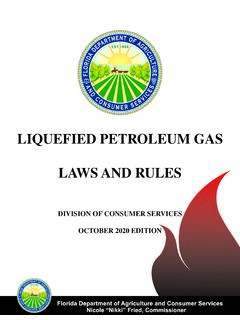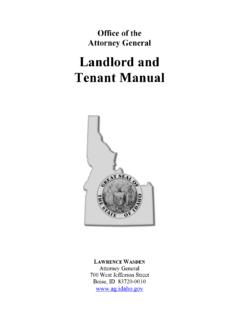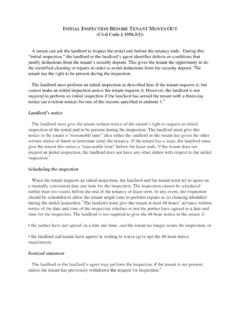Transcription of Florida's Landlord/Tenant Law
1 When You Decide to Move Military Service We re Here to Help! Failure to Meet Obligations Section , Florida Statutes provides that a service member may terminate his or her rental agreement under certain conditions. The Florida Department of Agriculture and Consumer Services functions as the state s clearinghouse for consumer complaints. For a free copy of the full text version of the statute or additional information, call 1-800-HELP-FLA (435-7352) or 1-800-FL-AYUDA (352-9832) en Espa ol, or visit our website at Except for the failure to pay rent, a landlord must notify you in writing of any shortcomings and give you seven days in which to correct the situation.
2 If you still have not complied after seven days, the landlord can begin the eviction process based on non-compliance. Other Evictions Section (2)(a), Under certain circumstances, if you have exhibited a lack of consideration for the rights and privacy of others, a landlord has the right to require you to move with very little notice. In some cases (destruction, damage, misuse of property, unreasonable disturbances), the landlord does not have to give you an opportunity to remedy the problem and may terminate tenancy by giving you a seven-day written notice.
3 Each eviction case is unique, so be sure to obtain legal advice. A landlord MAY NOT evict you solely in retaliation for the tenant complaining to a governmental agency about code violations or asserting other tenant rights . Non-Payment of Rent Section (3), The landlord must serve you, the tenant , a written notice allowing three days (excluding weekends and legal holidays) for you to pay the rent or move from the premises. If you do not pay the rent or move, he/she may begin legal action to evict you. In order for the landlord to gain payment of rent or possession of the dwelling, he/she must file suit in county court.
4 If the court agrees with the landlord, you will be notified in writing. You then have five days (excluding weekends and legal holidays) to respond also in writing to the court. If you do not respond or a judgment is entered against you, the clerk of the county court will issue a Writ of Possession to the sheriff who will notify you that eviction will take place in 24 hours. Section , A tenancy without a specific duration may be terminated by either party giving written notice in the manner prescribed by statute prior to the end of the tenancy period, as follows: Week to Week ------------ 7 days Month to Month --------- 15 days Quarter to Quarter ----- 30 days Year to Year ------------- 60 days Section , Florida Law does not allow a landlord to force a tenant out by: Shutting off the utilities or interrupting service, even if that service is under the control of or the landlord makes payment.
5 Changing the locks or using a device that denies the tenant access; Removing the outside doors, locks, roof, walls or windows (except for purposes of maintenance, repair or replacement); and/or Removing the tenant s personal property from the dwelling unless action is taken after surrender, abandonment, recovery of possession of the dwelling unit due to the death of the last remaining tenant in accordance with section (3)(d), , or lawful eviction. If any of these occur, the tenant may sue for actual and consequential damages or three months rent, whichever is greater, plus court costs and attorney s fees.
6 The landlord may also enter at any time when: The tenant has given consent; In an emergency; The tenant unreasonably withholds consent; and/or, The tenant is absent from the premises for a period of time equal to one-half the time for periodic rental payments. If the rent is current and the tenant notifies the landlord of an intended absence, then the landlord may enter only with the consent of the tenant or for the protection or preservation of the premises. If the Landlord Does Not Comply Section (1), You may be able to withhold rent if your landlord fails to do what the law or rental agreement requires.
7 However, you must announce your intentions in writing by mail, preferably certified, at least seven days before the rent is due to allow time to remedy the problem. If the problem is not corrected within the seven days and you withhold the rent, the landlord may take you to court to collect it. Under these circumstances, you must pay the rent into the court registry, pending the judge s determination in the case. If the tenant Does Not Comply Section (2), You can be evicted for not living up to the agreement.
8 The process of removal depends on the breach. Don t forget to give the required notice as stated in your rental agreement. The information above indicates appropriate notification if a specific time period is not included in the rental agreement. Be sure to check your rental agreement for any other specified condition. Under certain circumstances, if allowed by the provisions of the rental agreement, a rental agreement may be ended when either party gives written notice to the other of their intention.
9 Send all correspondence relating to your intentions to the landlord by certified mail or deliver it by hand and insist on a receipt. It is usually a good idea to talk with the landlord in person, too. If you must cancel a lease before its expiration date, perhaps the landlord will accept the security deposit as the total financial obligation. If so, be sure to obtain a signed agreement to this effect from the landlord. When you move from a rental unit no matter the duration be sure to settle all accounts.
10 Terminate utility service the day you leave; notify the landlord, post office and others of your new address; and make other arrangements to minimize inconvenience to the landlord or the new tenants. One of the most important responsibilities as a tenant is to leave the premises in a clean condition for the next occupant. Be sure to vacuum, sweep, clean all rooms, cabinets and appliances, as well as other areas specified in the terms and conditions of the rental agreement. Take a last walk-through with the landlord. Note any damages in writing and reach a final agreement.

















